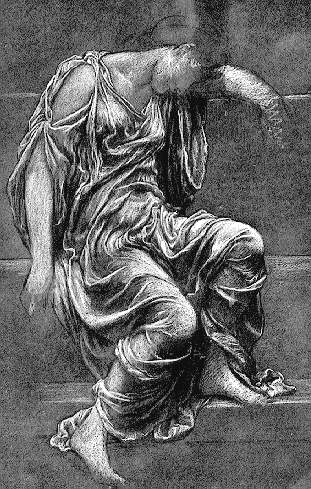We exist alone
If I felt well and not too miserable, I was no longer jealous, I no longer
had any grievance against her, I wanted to see her at once, to kiss her, to
live happily with her ever after. The act of telegraphing to her 'Come at once'
seemed to me to have become a perfectly simple thing, as though my new mood
had changed not merely my attitude, but things external to myself, had made
them easier. If I was in a sombre mood, all my anger with her revived, I no
longer felt any desire to kiss her, I felt how impossible it was that she
could ever make me happy, I sought only to harm her and to prevent her from
belonging to other people. But the outcome of these two opposite moods was
identical: it was essential that she should return as soon as possible. And
yet, whatever joy I might feel at the moment of her return, I sensed that very
soon the same difficulties would recur and that to seek happiness in the
satisfaction of a desire of the mind was as naive as to attempt to reach the
horizon by walking straight ahead. The further the desire advances, the further
does real possession recede.
 So that if happiness, or at least the absence of
suffering, can be found, it is not the satisfaction, but the gradual reduction
and the eventual extinction of desire that one should seek. One seeks to see
the beloved object, but one ought to seek not to: forgetting alone brings
about the ultimate extinction of desire. And I imagine that if an author were
to publish truths of this sort he would dedicate the book that contained them
to a woman with whom he would thus take pleasure in striking up a relationship,
saying to her: 'This book is yours.' And thus, while telling the truth in his
book, he would be lying in his dedication, for he will attach to the book's
being hers only the importance that he attaches to the stone which came to him
from her and which will remain precious to him only so long as he is in love
with her. The bonds between ourselves and another person exist only in our
minds. Memory as it grows fainter loosens them, and notwithstanding the
illusion by which we want to be duped and with which, out of love, friendship,
politeness, deference, duty, we dupe other people, we exist alone. Man is the
creature who cannot escape from himself, who knows other people only in
himself, and when he asserts the contrary, he is lying.
So that if happiness, or at least the absence of
suffering, can be found, it is not the satisfaction, but the gradual reduction
and the eventual extinction of desire that one should seek. One seeks to see
the beloved object, but one ought to seek not to: forgetting alone brings
about the ultimate extinction of desire. And I imagine that if an author were
to publish truths of this sort he would dedicate the book that contained them
to a woman with whom he would thus take pleasure in striking up a relationship,
saying to her: 'This book is yours.' And thus, while telling the truth in his
book, he would be lying in his dedication, for he will attach to the book's
being hers only the importance that he attaches to the stone which came to him
from her and which will remain precious to him only so long as he is in love
with her. The bonds between ourselves and another person exist only in our
minds. Memory as it grows fainter loosens them, and notwithstanding the
illusion by which we want to be duped and with which, out of love, friendship,
politeness, deference, duty, we dupe other people, we exist alone. Man is the
creature who cannot escape from himself, who knows other people only in
himself, and when he asserts the contrary, he is lying.
(Marcel Proust, Albertine Gone, ed. & tr. Terence Kilmartin, Chatto & Windus, London, 1989, p. 33)